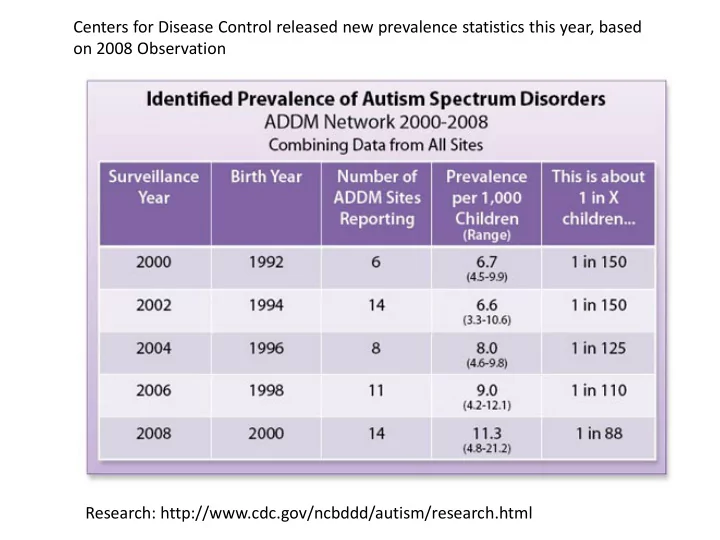

Centers for Disease Control released new prevalence statistics this year, based on 2008 Observation Research: http://www.cdc.gov/ncbddd/autism/research.html
Spectrum of Abilities 1 • Attention to detail 2 • Honesty with no bias 3 • “Deep” Learners
Rule- Mannerisms Oriented Ignorance of Immature Teen Culture Interests Sensory Issues Aspergers Society of America -- “Why It’s Hard for Aspies to Make Friends”
1. Mannerisms- Talking too loud Suggestions: Avoid games, icebreaker, or situations that • require a quiet voice or use a reminder tool Build on strengths – make the teen your • “announcer” 2. Mannerisms - Talking too much on favorite topic Suggestions: Institute a “Back on Topic” tool • Build on strengths – allow them a little • time to teach about their favorite topic
3. Mannerisms - No eye contact Suggestions: Assume attention is being paid & don’t • insist on eye contact Build on strengths – make the teen your • “recorder” 2. Mannerisms - Won’t interact, share opinions or thoughts Suggestions: * Allow thoughts & ideas to be expressed in a way other than verbal, for example, a drawing or making a film
1. Rule-Oriented - Knowing the Rules = Security Suggestions: Use an Agenda and stick to it • Enforce time or use a time clock or visual • aid to keep oriented to time Keep group apprised of changes ahead of • time – preferably in writing Be literal about how much flex might be in • any rule – even if it seems “obvious.” As much as possible, stick to your word! • Explain metaphors •
1. Immaturity - Liking things for “younger” kids Suggestions: Devote some group time to discussing why • we hang on to things we used to like & why its ok. Build on strengths – make it a point of • pride that all preferences are honored Point out that resisting peer pressure can • be beneficial
2. Immaturity - Emotional Immaturity Suggestions: Patience & Understanding – sometimes • having some explicit teaching about how we handle negative events, upsetting news, or simply not getting our own way can be beneficial to the whole group. Use opportunities to model mature • behavior
1. Sensory - Senses are at different levels Many AS teens have a poor sense of smell • but an overly developed tactile sense, and sensitivity to noise and light. Use tactile aids for calming • Avoid changing light levels, crowds and • echoing noises Allow a “safe place” – a spot where teen • feels comfortable to retreat to under stress Build on strengths – make a game of • “micro-observation” or asking the AS Teen to recall a situation
2. Sensory - Discomfort and anxiety If AS Teens are refusing to try it a task or • activity it is most likely because the task or situation is very UNCOMFORTABLE to their senses. What may seem fine to a an NT can cause great distress to AS Teens. Build on strengths – allow everyone in the • group to share their sensory preferences.
Resources • Rhythms of Grace – CT site www.rhythms-of-grace.org • A Special Grace – MA site www.ASpecialGrace.com • Facebook : Rhythms of Grace – Sensory- Friendly Worship • Twitter: @RevRebe
Autism “Characteristics” Autism “Characteristics” Autism “Characteristics” Autism “Characteristics” SENSORY • Hypersensitive to – Sound – Light/dark – Changes in routine – Textures – Touch – Body in space • Preference for – Low noise – Steady lighting – Stable routine – Enclosed space
Autism “Characteristics” Autism “Characteristics” Autism “Characteristics” SOCIAL • May – Circle & Touch – “Stim”(Rock, flap,tics) – Respond non-verbally • May Not – Converse – Make eye contact – Respond to verbal inquiry or instruction – Notice what others are doing
1. Teen Culture - Dressing “Cool” Suggestions: Devote some group time to discussing the • dynamic that perception can lead to judgment Build on strengths – assign an observation • activity to the whole group. How can this teen teach others about being non- judgmental?
2. Teen Culture - Hygiene Suggestions: * Devote some group time to social expectations: What is rude and what is not? • Why do others expect you to be clean? • * Build on Strengths – remember how rule- oriented these teens are?
3. Teen Culture - Honesty and Non-Judgment One of the AS Teens greatest strengths can be their ignorance of social judgment and norms. They tend to be honest and non-judgmental of others. They will not usually share the prejudices or stereotypes of their peers.
Recommend
More recommend